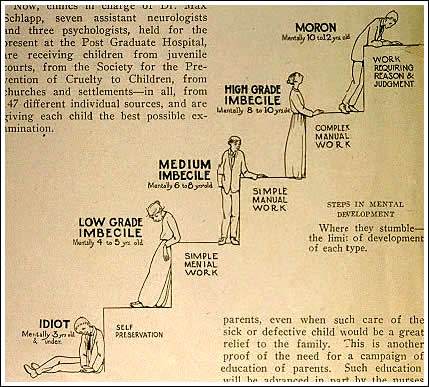As late as the an first two decades of this century people with mental disorders were routinely referred to by terms that would seem shocking today; the picture above is taken from a leading book on ,mental health in children published in 1913. Fortunately today such degrading terms are no longer acceptable to society. However we remain in just as much confusion over how to address the person with intellectual disability. Over the years different authors and associations have tried to define a set of terms. Here we look at those terms and the rationale for adopting the term intellectual disability.
The story of how we treat individuals with intellectual disability can be traced by studying the evolution of the institutions we have set up to treat, study and better the lives of individuals with intellectual disability. From the punitive ,methods of the 19th century where people were branded as lunatics and chained, to the 21st century we have indeed come a long way. One of the organizations that has played an important and certainly influential role in how we perceive impaired intellect has been the American association on intellectual and developmental disabilities (AAIDR) previously called the American Association on Mental Retardation (AAMR).
Founded in 1876, AAIDD is the world's oldest and largest interdisciplinary organization of professionals concerned about mental retardation and related developmental disabilities. With headquarters in Washington, DC, AAIDD has a constituency of more than 50,000 people and an active core membership of over 3,500 in the United States and in 55 other countries. The mission of AAIDD is to promote progressive policies, sound research, effective practices, and universal rights for people with intellectual disabilities.
AAIDD has updated the definition of mental retardation ten times since 1908, based on new information, changes in clinical practice, or breakthroughs in scientific research. The 10th edition of Mental Retardation: Definition, Classification, and Systems of Supports (2002) contains a comprehensive update to the landmark 1992 definition and provides important new information, tools, and strategies for the field and for anyone concerned about people with intellectual disability.AAIDD anticipates publishing the next classification manual in 2010/2011.
Intellectual disability is the currently preferred term for the disability historically referred to as mental retardation. Although the preferred name is intellectual disability, the authoritative definition and assumptions promulgated by the American Association on Intellectual and Developmental Disabilities (AAIDD and previously, AAMR) remain the same as those found in the Mental Retardation: Definition, Classification and Systems of Supports manual









No comments:
Post a Comment